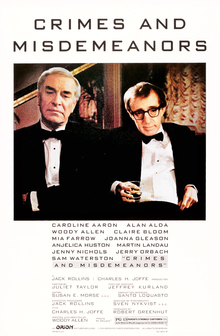Crimes and Misdemeanors
| Crimes and Misdemeanors | |
|---|---|

Theatrical release poster
|
|
| Directed by | Woody Allen |
| Produced by | Robert Greenhut |
| Written by | Woody Allen |
| Starring |
|
| Music by | Franz Schubert |
| Cinematography | Sven Nykvist |
| Edited by | Susan E. Morse |
|
Production
company |
Jack Rollins & Charles H. Joffe Productions
|
| Distributed by | Orion Pictures |
|
Release date
|
|
|
Running time
|
104 minutes |
| Country | United States |
| Language | English |
| Budget | $19 million |
| Box office | $18,254,702 |
Crimes and Misdemeanors is a 1989 American existential comedy-drama film written, directed by and co-starring Woody Allen, alongside Martin Landau, Mia Farrow, Anjelica Huston, Jerry Orbach, Alan Alda, Sam Waterston and Joanna Gleason.
Although a failure at the box office, the film was met with critical acclaim, and it was nominated for three Academy Awards: Woody Allen, for Best Director and Best Original Screenplay, and Martin Landau, for Best Actor in a Supporting Role. In several publications, Crimes and Misdemeanors has been ranked as one of Allen's greatest films.
The story follows two main characters: Judah Rosenthal (Martin Landau), a successful ophthalmologist, and Clifford Stern (Woody Allen), a small-time documentary filmmaker.
Judah, a respectable family man, is having an affair with flight attendant Dolores Paley (Anjelica Huston). After it becomes clear to her that Judah will not end his marriage, Dolores, scorned, threatens to inform his wife of their affair. Dolores's letter to Miriam is intercepted and destroyed by Judah, but she sustains the pressure on him with threats of revelation. She is also aware of some questionable financial deals Judah has made, which adds to his stress. He confides in a patient, Ben (Sam Waterston), a rabbi who is rapidly losing his eyesight. Ben advises openness and honesty between Judah and his wife, but Judah does not wish to imperil his marriage. Desperate, Judah turns to his brother, Jack, who hires a hitman to kill Dolores. Before her corpse is discovered, Judah retrieves letters and other items from her apartment (where he sees her bloody corpse) in order to cover his tracks. Stricken with guilt, Judah turns to the religious teachings he had rejected, believing for the first time that a just God is watching him and passing judgment.
...
Wikipedia
